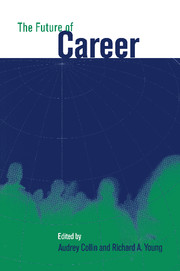Book contents
- Frontmatter
- Contents
- Notes on contributors
- Acknowledgements
- 1 Introduction: framing the future of career
- Part 1 Changing contexts
- 2 ‘Fracture lines’ in the career environment
- 3 Some contributions of sociology to the understanding of career
- 4 Renovating the psychology of careers for the twenty-first century
- 5 Changing career: the role of values
- 6 Dancing to the music of time
- Part 2 New perspectives
- Part 3 New directions for theory, practice and policy
- Author index
- Subject index
3 - Some contributions of sociology to the understanding of career
Published online by Cambridge University Press: 06 January 2010
- Frontmatter
- Contents
- Notes on contributors
- Acknowledgements
- 1 Introduction: framing the future of career
- Part 1 Changing contexts
- 2 ‘Fracture lines’ in the career environment
- 3 Some contributions of sociology to the understanding of career
- 4 Renovating the psychology of careers for the twenty-first century
- 5 Changing career: the role of values
- 6 Dancing to the music of time
- Part 2 New perspectives
- Part 3 New directions for theory, practice and policy
- Author index
- Subject index
Summary
This chapter examines career from a sociological perspective, with emphasis on the changes that have affected employment and work organisation during recent decades. First, we argue that the context of the 1950s and 1960s, which was characterised by economic prosperity, made two quite different sociological theories plausible. While status attainment theory asserts that motivation allows people to seize the opportunities offered by the labour market, reproduction theory maintains that far from being chosen, a career is assigned on the basis of an individual's social and economic origin. The first theory implies that individuals have to adapt through adequate socialisation and the second suggests that societal structures be transformed. Secondly, the employment crisis of the 1980s and 1990s is described and new theories such as human capital theory, segmentation theory, and regulation theory, which attempt to provide an explanation of career interruptions, are presented. Thirdly, courses of action for interventions in career based on these recent theories are formulated.
In sociology, career is usually examined in terms of social mobility, which describes the movement of individuals or family units within the system of occupational categories or the social class system (Boudon & Bourricaud, 1994). The concept of mobility has been used as an indicator of the relative rigidity of both structures and the social order, and has been linked with career prospects. According to Emile Durkheim (1858 – 1917), who represents an early theoretical perspective emphasising social structure, people had little scope for action when it came to occupational choice. He maintained that social facts represent ‘ways of acting or thinking with the peculiar characteristic of exercising a coercive influence on individual consciousness’ (Durkheim, 1964, p. liii).
- Type
- Chapter
- Information
- The Future of Career , pp. 37 - 52Publisher: Cambridge University PressPrint publication year: 2000
- 4
- Cited by

